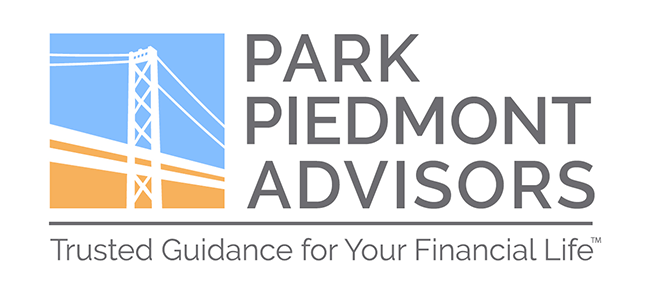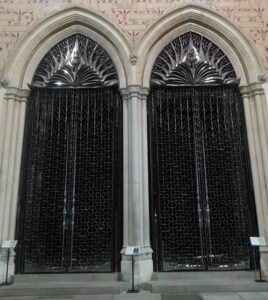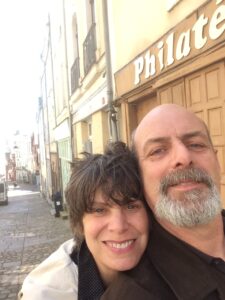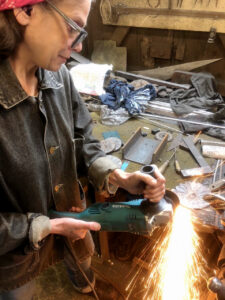Long-time Park Piedmont client Betsy Houlton is one of the firm’s few international clients. Although she grew up on New York’s Upper West Side, Betsy moved to France in 2006 with her son Will, then just a baby, as part of a metalwork journeymanship, a process of traveling and studying in different metal workshops.
It was during one of these workshops that she met her now-husband and business partner, Simon Robinson. The two of them run Forge Robinson, a company that specializes in forged stainless steel. Simon and his father had operated the company in England before moving their workshop to Normandy in 2005.
Their most well-known commission is an astounding pair of stainless steel gates created as a gift for the royal wedding of Charles and Diana in 1981-1982. These forged stainless steel gates were the first of their kind in the world, a watershed for the industry, and still stand in the Great Hall of Winchester Castle.
Betsy and Simon operate Forge Robinson directly from a workshop attached to their home, where they create bespoke pieces for clients worldwide. Betsy is also currently pursuing an Art Therapy degree, with a plan to use forging iron in a therapeutic framework. She and Simon have plans to open a small forge with guest accommodations where people can swing a hammer, create something in the forge, and enjoy the “Normandy Bocage,” the beautiful, hedged countryside where they live.
Betsy sat down to talk with us about life with money – and the life of an artist.
What is your earliest money-related memory?
I remember a shiny quarter that mated so perfectly with a gumball machine. It was a beautiful coin. And then later I was sort of the banker for my family. I had IOUs written out, and I had a little bank book with a stamp, and that was great. But somehow, after that, it all became more abstract.
What’s the last thing you purchased that brought you joy?
In the joy department, it would be hard to out-do my Potcake dogs who come to us from the streets of Guadeloupe thanks to a wonderful volunteer association. They keep my husband and me laughing and always provide fodder for upbeat conversation. For me, providing a home and building a life is connected with well-being and joy.
Do you have a favorite tip or strategy for saving?
Buy a house, if you can. When I was growing up, my father, being an Englishman, wanted to buy a house. It was such an English thing. In New York, all my friends had apartments. It was a very unusual situation that we actually had a house.
But when I’ve looked back, in a sort of throughline of developing strategies for living, it’s really all thanks to the fact that my father had the idea of purchasing a house in New York City in the 1960s. My parents bought that brownstone for around $20,000 so they could have a place to live. I don’t think they were thinking about making money [from it as an investment]. Yet the house provided for us much more than anyone could have planned for.
After my mom died, my dad was paralyzed from a stroke. His mind was all there, but he needed 24-hour care. So we offered room and board to three men in exchange for a shift taking care of my father. They each had to have a job outside because we weren’t offering money, but we bartered. It was over a period of five years, and they grew to love him, and in many ways, it was a very enriching time for my father.
But during that time, Vic [Levinson, co-founder of Park Piedmont] came into our lives. We were having to sell furniture, but Vic helped us get financing from the collateral of the brownstone. We were completely clueless, but he cared about us, and he didn’t let us go under.
What is one purchase you’ve made that felt especially weighty – or filled with possibility?
After my dad passed away, my sister and I eventually sold our parents’ brownstone, and I used my share of the money to purchase a home in Jersey City, which I now rent out. I wanted to have a house for many reasons, but the throughline – from my father wanting a house, to me working with homeless organizations – meant that having a home was a basic and profoundly important need that I could understand and that I could fulfill as a caring landlord. I know that a family is being housed, and it gives me a lot of joy to, in some form, pass on the home that I received. So that purchase felt weighty.
What is the best gift you have ever given or received?
There’s definitely a distinction between monetary gifts and non-monetary gifts. Monetarily, definitely the brownstone from my parents.
Non-monetarily: being a mom and having a family. And also, being an artist is not necessarily a winner in terms of financial stability, but the deep joy and peace of mind that comes from being an artist brings a feeling of well-being, and that is a priceless gift.
Is there a decision you’ve made, or step you’ve taken, that has made your life with money less stressful?
Living in rural France allowed us to buy a house without a mortgage, and we have a workshop attached to our home, so we don’t have to pay extra rent. We live frugally. We have a garden, use the library, and wear out our clothes.
What do you wish you could tell your 20-year-old self about life with money?
My dear friend connected my sister and me with Vic when I was in my 20s. From Vic, I learned that it’s always okay to ask questions. Ignorance is not bliss. We put our trust in him, but when we wanted to say, “Can we just hand it over to you?” he always said, “Don’t do that. Never do that. Don’t ever transfer all your decision-making over to somebody else. You always have the right to ask questions.” I think of him as our Cosimo de’ Medici. Not that he gave us his funds, but he cared about us. So my advice is: choose good advisors.
Another thing is, understand how to keep account of spending. It doesn’t sound very romantic, but when I was graduating university, I was sent credit cards. Did I know what they were for? No. Nobody had ever taught me about money. So I had the student card. I would pay for everything with it, with no sense of understanding that, on the other end, was my mom. Nobody had explained to me how it worked.
What advice has shaped your life with money? Who gave it to you?
Don’t feel as though you need to spend money to enjoy life. Foster what you love. For me it was art. My mom never stopped working up until almost the day she died. She loved being a writer, although she did not always enjoy having to work so hard. “The bills keep coming in!” she said, but she had an attitude that life was a gift.
For a time I worked with homeless organizations, developing original theatre presentations based on their stories, and with homeless pregnant women for a small stipend. My parents always thought this was great. They understood that there was a deep value to what I was doing and never chided me about how little money I was making, although maybe they worried in private. I’m not suggesting this is a good thing. It’s important to talk about money.
There is a notion that artists can live on air – that their bills are somehow not as much as an accountant’s, or a banker’s, or a lawyer’s. And there is a bohemian notion of the starving artist that seems to transcend social class. But many artists did indeed die of cold and starvation.
Until Vic, I didn’t understand the relation between living and money. That is why I loved the name of this column: Life with Money. It is a whole lot better than life without money.



